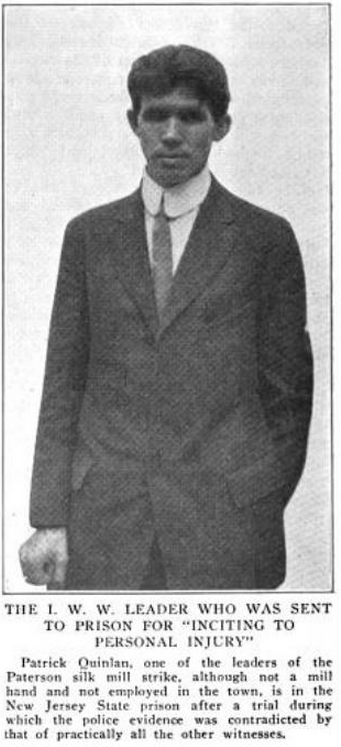There are no limits to which
powers of privilege will not go
to keep the workers in slavery.
-Mother Jones
Hellraisers Journal, Wednesday December 27, 1916
From the Appeal to Reason: Newly Released, Quinlan Describes Prison Life
Unspeakable Horrors of New Jersey’s
Bastile Exposed by Quinlan
—–“Political Prisoner”, Recently Liberated After Serving Unjust Sentence, Tells Appeal Readers of Atrocities Practiced on Helpless Victims of Social System-Quinlan’s Remarkable Training as Labor Agitator Combined With His Terrible Experience in Penitentiary Brings Forth This Unprecedented Story of “Crimes Against Criminals.”
—–
BY PATRICK L. QUINLAN
My experience in New Jersey’s penitentiary compels me to say that I am not prepared to accept in full the statement so often made that our public institutions reflect the spirit, the mind of the people. If it were entirely true that institutions were the mirror of a people, then the state of New Jersey and its two and a half million inhabitants would occupy the largest place in Dante’s Inferno of lost souls. One would be compelled to conclude that the people of New Jersey were fiendish in their cruelty, diabolical in their oppression, medieval in their conception of their duties toward the inmates of their state prison, located within the shadow of their capitol at Trenton. But they are not, I am sure, more cruel, not more oppressive, nor more medieval than the people of other states; they are, only, perhaps, more indifferent and, I hope they will pardon me, more ignorant. Their social soul, their public conscience, is not formed to harmonize with the spirit of the times, nor is it developed to work sympathetically with its progressive sister states.
If New Jersey’s penitentiary reflected the people of the state, then we would be prepared to disagree with Edmund Burke’s famous dictum that one cannot indict a whole people, and proceed to charge the two and a half million people of the state of New Jersey with murder, robbery and graft.
Pictures the Bastile.
With this brief apology for the citizens of New Jersey, I will, in the following lines, give the readers of this paper an unexaggerated picture of New Jersey’s bastile, with the hope that the same good results will be accomplished for its unfortunate inmates as were done for the victims of Fort Leavenworth federal prison.
Men who had been in every big prison in the United States told me in language that was emphatic as well as picturesque, that Trenton’s “Big House” was the worst prison in the country, and the study of prison reports and the literature of penology convince me that the convicts told the truth. Personally, I cannot imagine anything worse except the contract prison camps of the south and the Siberian dungeons, where the victims of the Russian autocracy are buried alive.

